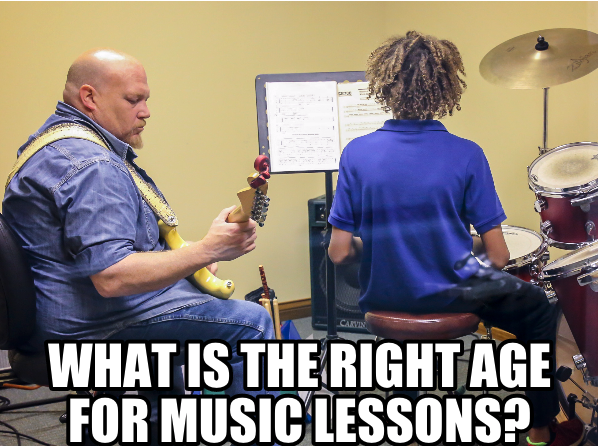
I’m often asked “When is the right age to begin music lessons?” by parents of young children. Of course, every child is different with their own gifts and temperaments, so there is no definitive answer to this question. As long as they’re able to physically support themselves and the instrument safely without falling over and hurting themselves is one way to determine if they’re ready. Another consideration is one that applies not only to children, but many adults as well. I’m referring to acquired skills, often introduced in pre-K, of basically staying put and minding the adult in the room. Skills like listening to instruction, sustained focused attention, familiarity with the experience of being confronted with knowledge that is unfamiliar and the ability to absorb and contextualize new information and experience. Basically, learning how to learn; these abilities are not universally present in adults so it bears mentioning again that it is, indeed, an acquired skill that is honed and developed over time with varying degrees of proficiency.
Incorporating music instruction in the extracurricular way that is typically the norm is a lesson in time management, individual commitment, and self-motivation. Music lessons are also an exercise in the kind of sustained, focused attention that is increasingly absent in modern life. So, you can see how these conversations with parents about their kids and these points I raise apply to everyone including adult learners as well, right? The common thread here is that learning and the way we go about doing it is a process that enriches, nurtures and imbues meaning to life no matter how old we are. While I advise the parents of young children, I’m also thinking of the adults who ask me the same questions of themselves, wondering if there’s any truth to the idea of old dogs and new tricks.
I’ve been thinking about how we’re conditioned to the idea that learning is a means to an end rather than a way of being, a lifestyle if you will. It totally makes sense; we’ve commoditized education because time, money and resources are limited. We view the world through a lens that values the role of business in our lives. We’re taught about fiscal responsibility and the importance of return-on-investment, but being learned wasn’t always viewed this way. When parents of young children ask me when the right age is to start music lessons they’re thinking of the health and enrichment of their children. The instinctual need to nurture and care for our children is what drives these queries. It’s only later, when we get older, that the fresh-baked newness goes stale and we start thinking “practically” and the wonder of life and learning wears off. For many of us, learning is generally associated with institutionalized education, a crucible, running of a gauntlet whose end result is socio-economic status in a life that is otherwise brutish and short.
That sounds harsh, right? Well, it doesn’t have to be that way because one way to hold on to the taste that refreshes, a love of learning, is to embrace the idea that the finer things in life don’t come easy. We value the things, experiences and skills we work hard for. Instant gratification may have its place in our lives but it shouldn’t be the default state of being. This is one of the primary lessons parents teach young children because who really wants to have a kid like Veruca Salt, Roald Dahl’s portrait of the horribly spoiled child who meets a particularly bad fate in Charlie and the Chocolate Factory? A bad nut, indeed!
iGeneration, the cohort coming up after the Millennials have always had an iPhone or iPad in their life. When I read about and listen to the concerns over the impact of these ubiquitous devices on developing minds and how they stimulate the same areas of the brain with the endorphin rush of heroin use I’m like, “Yes! Sign your kid up for music lessons right away! As a matter of fact, you might benefit from it too! Get the whole family involved! And if it’s not music lessons then get them in dance, theater, or pottery, whatever – something that explores and stimulates creativity for all of our sakes!”
I truly believe in music education to provide a needed balance that we can all benefit from because, even if you play poorly, when you’re playing for yourself, that’s all that really matters. By engaging in the creative process, we humble ourselves before the masters who’ve come before us and who will hopefully come after us. This lesson in humility is not a bad thing, it builds character. A straight shot of it is a good way to gain perspective, open your heart, free your mind and make an important connection in the real, rather than virtual world. The time to start music lessons is right now, because what we all need is a full and balanced life. There are many ways to go about the pursuit of one but few as universally appealing and personally rewarding as taking up an instrument. The time devoted to it is a gift that we give to ourselves, one whose return on investment is measured in ways far more valuable than any currency can buy.
